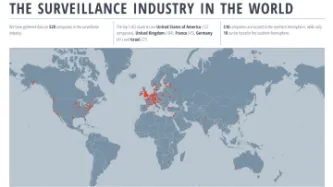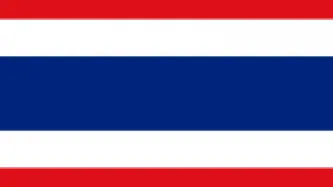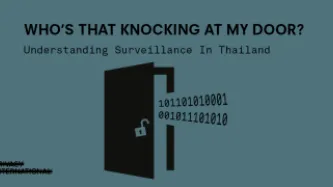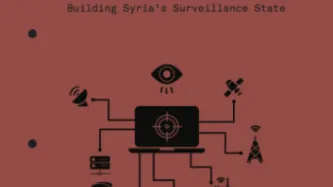Advanced Search
Content Type: Long Read
Creative Commons Photo Credit: Source
In the midst of continued widespread public outrage at the US government’s brutal ‘zero-tolerance’ policy around immigration – multiple data and analytics companies have quietly avoided answering questions about their role in feeding the US Immigration and Customs Enforcement (ICE) agency’s data backbone. These companies are bidding to work with an agency that has time and time again shown itself to be a brutal and problematic.
Privacy International…
Content Type: Impact Case Study
What is the problem
For over two decades we have been documenting an alarming use and spread of surveillance. It is no longer just the wars on terror or drugs or migration that is driving this trend. The management of health crises and distribution of welfare regularly are among others being used to justify this turn to increasingly invasive forms of surveillance. From country to country we see the same ideas and the same profiteers expanding their reach.
When we first released our report on…
Content Type: Explainer
What is the Global Surveillance Industry?
Today, a global industry consisting of hundreds of companies develops and sells surveillance technology to government agencies around the world. Together, these companies sell a wide range of systems used to identify, track, and monitor individuals and their communications for spying and policing purposes. The advanced powers available to the best equipped spy agencies in the world are being traded around the world. It is a…
Content Type: Report
¿Existen ciudades inteligentes? ¿O son un pretexto para recolectar y procesar más datos? Este informe examina la realidad del mercado de las ciudades inteligentes más allá del uso del término de marketing "inteligente" y las iniciativas existentes. También consideramos las consecuencias y las importantes preocupaciones que surgen en términos de privacidad y otros derechos humanos.
Content Type: Long Read
The battle for Kenyan voters’ allegiance in the 2017 Presidential election was fought on social media and the blogosphere. Paid advertisements for two mysterious, anonymous sites in particular started to dominate Google searches for dozens of election-related terms in the months leading up to the vote. All linked back to either “The Real Raila”, a virulent attack campaign against presidential hopeful Raila Odinga, or Uhuru for Us, a site showcasing President Uhuru Kenyatta’s accomplishments. As…
Content Type: Report
When you rent a car at the airport, use a car-share for a family day trip, one of the first things you are likely to do before setting off on your journey, is to connect your phone to the car. You switch on the Bluetooth and see a list of other people’s phones that were previously connected - Mike’s iPhone, Samsung Galaxy, Bikerboy_Troi, Dee Dee. You input your journey into the navigation, perhaps noticing stored locations of previous drivers.
Seems fairly innocuous? Wrong. Your name and…
Content Type: Report
Financial services are changing, with technology being a key driver. It is affecting the nature of financial services, from credit and lending through to insurance, and even the future of money itself.
The field of fintech is where the attention and investment is flowing. Within it, new sources of data are being used by existing institutions and new entrants. They are using new forms of data analysis.
These changes are significant to this sector and the lives of people it serves. This…
Content Type: Report
The smart city market is booming. National and local governments all over the world expect their cities to become more efficient, more sustainable, cleaner and safer by integrating technology, increasing data generation and centralising data to provide better services. From large multinationals to small start-ups, companies want their slice of the multi-billion dollars per year pie of municipal budgets and long-term government contracts.
But do smart cities even exist? And are our cities…
Content Type: News & Analysis
October 31st 2017 will mark the 3rd World Cities Day (we will forgive if you did not know that), with the general theme “Better City, Better Life.” On this date, PI will be launching its latest report “Smart Cities: Utopian Vision, Dystopian Reality”. This is an opportunity for us to ask: who exactly are our cities going to become better for?
Technology is often given as an answer when we are not sure what the question is. Cities are no exception to that. The current…
Content Type: Report
This investigation focuses on the techniques, tools and culture of Kenyan police and intelligence agencies’ communications surveillance practices. It focuses primarily on the use of surveillance for counterterrorism operations. It contrasts the fiction and reality of how communications content and data is intercepted and how communications data is fed into the cycle of arrests, torture and disappearances.
Communications surveillance is being carried out by Kenyan state actors, essentially…
Content Type: State of Privacy
Introduction
Acknowledgment
The State of Surveillance in Thailand is the result of a collaboration by Privacy International and Thai Netizen Network.
Right to Privacy
The constitution
Thailand experienced a coup d'etat in May 2014. According to Mishari Muqbil and Arthit Suriyawongkul, “their [the junta's] modus operandi seems to be the direct command of ministries and semi-governmental organisations to carry out tasks irrespective of existing legislation.”
Following…
Content Type: News & Analysis
This guest piece was written by Elonnai Hickok, Amber Sinha and Vanya Rakesh of the Centre for Internet and Society. It does not necessarily reflect the views or position of Privacy International.
In 2009, the Government of India set up the Unique Identification Authority of India (UIDAI) as an attached office of the erstwhile Planning Commission of India via an executive order. The mandate of the UIDAI was to assign a 12-digit unique identification (UID) number (…
Content Type: News & Analysis
An investigation released by Privacy International this week reveals the Facebook shut-down Thailand experienced in May 2014, at the height of the military coup, may have had more to do with attempting to surveil online communications, rather than censoring Facebook users. This revelation indicates there could be more to other previous internet shutdowns that have happened during times of political unrest.
In May 2014, following months of protest, the Thai military overthrew the…
Content Type: Report
This investigation looks at how surveillance is being conducted in Thailand. The first part of the investigation focuses on the ties between telecommunication companies and the state, and the second part of the investigation focuses on attacks conducted in order to attempt to circumvent encryption.
Content Type: Long Read
In July 2015, representatives of a private company met in a parking lot in Pretoria, South Africa to sell phone tapping technology to an interested private buyer. What they did not know was that this buyer was a police officer. The police had been tipped off that the company was looking to offload the surveillance technology, an IMSI catcher, to anyone who would buy it. It is illegal to operate such surveillance technology as a private citizen in South Africa, and illegal to buy…
Content Type: Report
Privacy International’s investigation contains evidence of the Syrian government’s ambitious plans and projects to monitor the national communications infrastructure, the technical details of which are revealed for the first time. Hundreds of original documents also highlight surveillance trade in this region leading up to and during the Arab Spring, which involved companies from around the world.
Content Type: Long Read
This report examines the emergence of social media based surveillance in Thailand, carried out potentially by people’s own networks of friends and family. It looks at the severe impact this has on personal privacy and points to potential solutions.
In May 2014, Thailand experienced a military coup – its second in eight years. A military government led by General Prayut Chan-o-cha seized power and overthrew the administration of Prime Minister Yingluck Shinawatra. The Army declared martial…
Content Type: News & Analysis
When it comes to tackling corruption, we need to critically engage with the role of technology. One technology in particular is biometrics, a technology that identifies and stores on a database the identity of an individual through some physical characteristic, usually fingerprints or an iris scan. Biometrics is increasingly being used in ID and voter registration schemes. It is a technology that raises privacy and data protection issues but notwithstanding…
Content Type: Report
Privacy International's new investigation (available in English and in Arabic), 'THE PRESIDENT'S MEN? Inside the Technical Research Department', sheds light on the Technical Research Department, a secret unit of the Egyptian intelligence infrastructure that has purchased surveillance equipment from German/Finnish manufacturer of monitoring centres for telecommunication surveillance, Nokia Siemens Networks, and Italian malware manufacturer, Hacking Team.
Content Type: Report
Privacy International's new report, For God and My President: State Surveillance in Uganda, exposes the secret surveillance operation and the government's attempts to buy further powerful surveillance tools, including a national communications monitoring centre and intrusion malware, in the absence of a rigorous legal framework governing communications surveillance
Content Type: Press release
Ugandan President Yoweri Museveni directed intelligence and police officials to use a powerful, invasive malware to spy on domestic political opponents – including parliamentarians, activists and media houses – following the 2011 presidential election, during a period of urban unrest and police violence, according to secret government documents obtained by Privacy International. A feature broadcast piece will air on BBC Newsnight on Thursday, 15 October.
Privacy International's new…
Content Type: Long Read
We hate to say we told you so.
Privacy International has for years warned that powerful surveillance technologies are used to facilitate serious human rights abuses with insufficient technological and legal safeguards against abuse.
We now have the most solid evidence to date that we were right. Our latest investigation uncovers disturbing evidence that substantiates our long held concerns.
Today Privacy International publishes an investigation (PDF) into communications surveillance in…
Content Type: Report
Over a dozen international companies are supplying powerful communications surveillance technology in Colombia. Privacy International examines the actors across the world involved in facilitating state surveillance.
The report is available in English and Spanish.
Content Type: Report
For nearly two decades, the Colombian government has been expanding its capacity to spy on the private communications of its citizens. Privacy International's investigation reveals the state of Colombia's overlapping, unchecked systems of surveillance, including mass surveillance, that are vulnerable to abuse.
See the report in English and Spanish.
Content Type: Press release
The release of a new report by Privacy International exposes Colombia's intelligence agencies' previously unknown history of developing communications surveillance capabilities outside of lawful authority.
The report “Shadow State: Surveillance law and order in Colombia” reveals, via previously unreleased documents, the Colombian police agencies' and intelligence services' long history developing surveillance systems. Rather than building a well-regulated system of surveillance after Colombia…
Content Type: Advocacy
The Pakistani government has significantly expanded its communication interception activities. This Privacy International report covers the intelligence services plan to capture all IP-traffic in Pakistan and other initiatives, pointing to gaps in the laws governing surveillance.
Content Type: Report
This report is the result of research conducted by researchers at Privacy International, coordinated by the London School of Economics and Political Science. The report was commissioned by the International Development Research Centre.
New technologies such as mobile phones and electronic medical record (EMR) systems promise to transform the provision and management of medicine all over the world. In the U.S. alone, billions are being spent on information technologies for healthcare.
Content Type: Report
This report has been prepared by Privacy International following a six-month investigation into the privacy practices of key Internet based companies. The ranking lists the best and the worst performers both in Web 1.0 and Web 2.0 across the full spectrum of search, email, e-commerce and social networking sites.
The analysis employs a methodology comprising around twenty core parameters. We rank the major Internet players but we also discuss examples of best and worst privacy practice among…



























